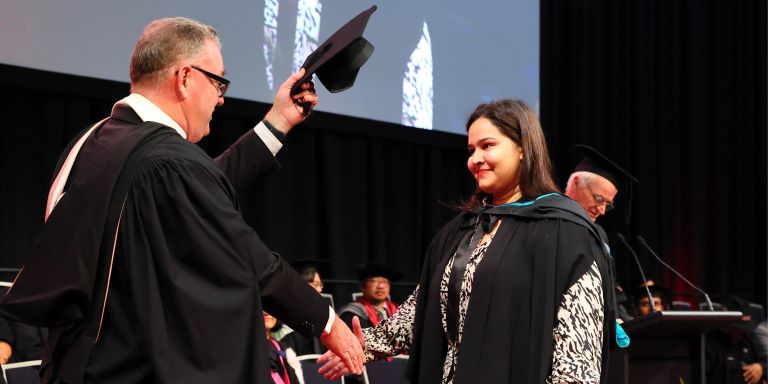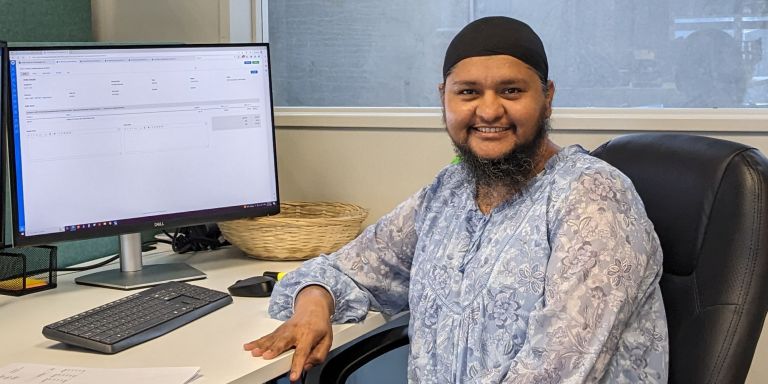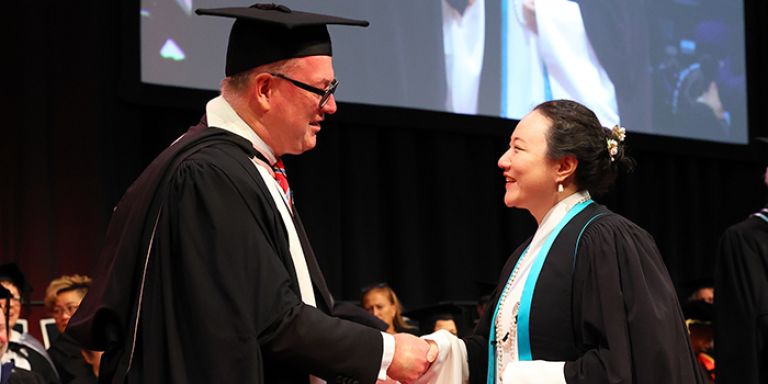Duration and study methods
The maximum time to complete this programme part-time is 10 years.Programme structure
Start dates
Domestic fees
International fees
NZD $26,000 (approx) per 120 credits
Free* study
Programme highlights
Are you looking for a qualification that will equip you with the knowledge, technical, and professional skills in the field of accounting?
Whether you have just left secondary school, have done previous study in related fields, or are wishing to return to study to develop new skills, the Bachelor of Accounting will give you the knowledge and skills to work in an ethical, socially responsible, and sustainable way in a variety of business settings that aligns to Ngā Kaupapa o te Tiriti o Waitangi.
You will learn to apply creative, strategic, and critical thinking to decision-making and problem-solving in evolving business environments and be able to demonstrate effective communication, self-management, digital literacy, and currency as an accounting professional.
You will also get hands-on experience with an accountancy project for a real business.
We will support you to succeed. Our classes are small so we can work closely with you to achieve your goals and, our strong industry relationships keep you up to date with the latest business practices.
This qualification will mean you are equipped to meet the educational requirements for membership of the Chartered Accountants Australia and New Zealand (CAANZ) and Chartered Practising Accountant Australia (CPA).
To find out more about what internships entail for both our learners and host organisations, click here.
Entry requirements
To be admitted to this programme all applicants must be at least 16 years of age on the date the programme starts, and meet one of the following requirements:
1. NCEA Level 3
2. Three subjects at level 3, made up of:
· 14 credits in each of three approved subjects
3. Literacy – 10 credits at Level 2 or above, made up of:
· 5 credits in reading
· 5 credits in writing
4. Numeracy – 10 credits at Level 1 or above, made up of:
· achievement standards – specified achievement standards available through a range of subjects, or
· unit standards – package of three numeracy unit standards (26623, 26626, 26627- all three required).
Or
ii. Satisfied the criteria for entrance to a New Zealand University with an equivalent to the above from another secondary qualification.
Or
iii. Successful completion of an approved qualification at Level 4 or above with a relevant pathway.
Language literacy admission requirements
All applicants must provide evidence that they have the necessary language literacy proficiency required for the Programme as demonstrated by the equivalence of:
· 10 NCEA literacy credits at Level 2 or above, made up of:
– 5 credits in reading
– 5 credits in writing
Applicants who are unable to provide evidence of the above may be required to demonstrate capability using an approved proficiency test or an equivalent described in NZQA Rules.
International applicants must provide evidence that they have the necessary English language proficiency required for the Programme as demonstrated by an IELTS score of 6.0 (academic) with no individual band lower than 5.5 from one test taken in the preceding two years, or an equivalent described in NZQA Rules and on Delivery Site English Language Requirements for International Ākonga Web-page.
Give yourself credit with Recognition of Prior Learning (RPL)
Did you know you can use the knowledge and experience you already have to your advantage?
Your previous work experience and on-the-job skills, volunteering, professional development, and other providers’ qualifications can be recognised as prior learning, matched against credits in our courses, and put towards your qualification – potentially saving you money and possibly helping you to complete your qualification faster Learn more.
Programme structure
You will need to complete 360 credits. 150 credits at level 5, 120 at level 6, 75 credits at level 7 and 15 elective credits at level 5, 6 or 7.
Please view a list of all course pre-requisites here.
Level 5
This course develops the knowledge, skills, and competencies to analyse organisations and engage with stakeholders in an Aotearoa New Zealand context.
This course develops the knowledge, skills, and competencies to analyse and manage the impact of environmental influences on an organisation.
This course develops the knowledge, skills, and competencies relevant to the core business functions of accounting, operations, human resource management, marketing and sales.
This course develops the knowledge, skills, and competencies to contribute to organisational change and innovation.
This course develops the knowledge, skills, and competencies to apply accounting concepts, standards, processes, and tax rules to prepare financial statements.
This course develops the knowledge, skills and competencies to record and process a range of financial transactions..
This course develops the knowledge, skills and competencies to calculate, analyse and interpret financial information to inform decision making for an organisation..
This course develops the knowledge, skills, and competencies to prepare and use budgets to monitor performance and determine internal controls to minimise risk for an organisation.
This course is to enable ākonga to understand the legal system and creation and interpretation of law and to apply knowledge and the skills of finding and applying law to a range of situations.
This course develops the knowledge, skills, and competence to apply elements of economic theory to contemporary business issues.
Level 6
Pre-requisite: ACCY5101 Introduction to Accounting and Taxation
This course develops the knowledge, skills, and competencies to use management accounting tools to plan, control and inform decisions about business operations.
Pre-requisites: ACCY5101 Introduction to Accounting and Taxation, ACCY5102 Applied Accounting
This course develops the knowledge, skills, and competencies to apply appropriate reporting framework to prepare and present financial statements.
Pre-requisite: ACCY5101 Introduction to Accounting and Taxation
This course develops the knowledge, skills, and competencies to apply taxation rules to a range of situations and entities.
Pre-requisite: ACCY5101 Introduction to Accounting and Taxation
This course develops the knowledge, skills, and competencies to apply business finance techniques.
This course develops the knowledge, skills, and competencies to analyse and evaluate business data to support decision-making.
This course develops the knowledge, skills, and competencies to apply the law to form and operate business entities and structures.
This course develops the knowledge, skills, and competencies to apply research methods within a business environment.
This course develops the knowledge, skills, and competencies to evaluate and use accounting information systems and technologies.
Level 7
Pre-requisite: ACCY6101 Intermediate Management Accounting
This course develops the knowledge, skills, and competencies to apply advanced management accounting techniques and skills to inform decision making.
Pre-requisite: ACCY6102 Intermediate Financial Accounting
This course develops the knowledge, skills, and competencies required for a critical understanding of financial accounting issues within an Aotearoa New Zealand context.
Pre-requisite: ACCY6102 Intermediate Financial Accounting
This course develops the knowledge, skills, and competencies to operate in the auditing and assurance profession.
Pre-requisite: ACCY6107 Research Methods
This course develops the knowledge, skills, and competencies to undertake a work-based project in accounting.
Elective Courses (Level 5)
You must select one Level 5 elective course from the following list:
The aim of this course is to develop the knowledge, skills, and competencies to analyse and identify effective leadership approaches that promote positive workplace culture, diversity and change.
The aim of this course is to develop the knowledge, skills, and competencies to evaluate operational issues and challenges and apply operational techniques for continuous improvement and compliance.
The aim of this course is to develop the knowledge, skills, and competencies to engage in business planning and develop strategies that improve organisational performance.
The aim of this course is to develop the knowledge, skills, and competencies to effectively manage projects and lead project teams.
When planning your degree, remember that not all courses are available each semester. You must check the programme structure above, the pre-requisites, electives and availability of your chosen courses in advance.
Do you want to study a single course, without enrolling into the full programme?
Courses within some of our programmes may be offered as an individual Certificate of Proficiency (COP). Programme entry requirements and course fees apply. For more information, please speak to our friendly Ask Me! team.
Career opportunities
Roles in business accounting such as: financial accounting, management accounting, auditing, taxation, treasury, banking and finance, risk management, business consultancy, across the private and public sector.
For potential salaries visit careers.govt.nz.
See why more people choose Accounting at MIT

“MIT has a strong academic reputation.”

“I chose MIT because they have a strong academic reputation. The practical, hands-on learning gave me confidence, and small classes mean more one-on-one time with lecturers. The lecturers were really supportive and very understanding. They were available to offer support, even on weekends. The friendly atmosphere is what I enjoyed the most.
I pursued the Bachelor of Applied Management (Accounting) CAANZ/CPA Pathway as I enjoy problem-solving. My father is also an accountant, so it’s in my blood. I plan to do CA in the near future. The CAANZ/CPA Pathway is what most employers look for in the accounting field.
I’m now working as a Group Assistant Accountant for Smith and Smith, so it all pays off. It is worth the effort.
Stay dedicated and determined, no matter what. The moment you walk across that stage and place the graduation cap on your head, you won’t help but have the biggest smile on your face.”
Akashna Lal
MIT graduate

“The supportive family environment really stood out for me.”

“I’d always wanted to become a Chartered Accountant. Studying business and accounting at MIT was the first step in getting this qualification. It helped guide me to my current role as founder and Director of a small Chartered Accounting firm.
The practical nature of the learning at MIT and the lecturers who could use their personal industry experience as examples definitely helped cement my choice. The qualifications I gained gave me the base to work in roles in the public and private sectors. MIT offered the flexibility to study in the evenings while I was working full-time. The small classes helped in getting more one-on-one time with the lecturers and the supportive family environment really stood out for me.
Now my firm employs seven people, and I would definitely consider hiring more MIT graduates. The qualifications I received from MIT have helped me get to where I am today.”
Eli Elisara Saina Tagi
MIT graduate

“I chose to study at MIT because they have small class sizes.”

I chose to study at MIT because they have small class sizes and my study could fit around my work and personal life. Also, the accounting degree was recognised by the New Zealand Institute of Chartered Accountants which meant I could go straight into the profession once I graduated.
When I graduated from MIT my first job was with Transpacific Waste Management. One of the reasons they employed me was because I had gained a lot of practical skills at MIT, meaning I could hit the ground running when I started working for them.
My MIT degree has definitely given me a great foundation for my career.
Kirstin Burt
MIT graduate

“Accounting is a high demand job, and you can get a good salary in this field.”

“I chose MIT because of its strong reputation.
My qualification from MIT definitely helped me secure my current job as a tax consultant at KPMG. The course ‘Taxation in NZ’ helped me to obtain the academic and technical knowledge, and the industry project helped me to apply that knowledge into practice.
The learning at MIT is not just class based. For example, I am using my accounting and taxation studies regarding Deferred Tax treatment, Imputation Credits at my current role. I think it’s really important to have such learnings built into your course outline as it will make you learn those things faster at your job and distinguish you from others.
What I loved most is that MIT had small and manageable class sizes which helped me make good relationships with my lectures. I also made some good friends because of the team project work. My queries were also answered on a one-on-one basis which made me appreciate MIT even more.
Prior to studying I was working as a retail assistant as I could not get a job in accounting without having a qualification first. I have always had an interest in accounting, it’s what my father studied, so I guess, maybe its hereditary.
Accounting is a high demand job, and you can not only get a good salary in this field, but you can also have an option of setting up your own business and be self-employed.
I would highly recommend students to study at MIT. The small class size, interactive learning course pattern and friendly and helpful staff made my experience unique at MIT.”
Tanvi Mehandiratta
MIT graduate

“I bring the practise from my classroom assignments and exercises to my work.”

“I chose to study business and accounting because there are good job opportunities in these industries. If you take it seriously you will have a solid career and be recompensed for your good work.
I had recently moved to New Zealand, and I was learning English before studying. At MIT I felt included for the first time after three years of living in New Zealand, I felt I had a family, and I was finally being part of the New Zealand culture. I choose MIT because the campus is close to my house, however, soon I started loving the environment, the culture, the small classes, and the lectures. The lecturers know you by name, they will sit by your side, and they will help you out. You will learn real-word activities and will be confident about yourself.
I had assignments focused on practise; MIT led me to the job market faster.
I am in my current job because MIT placed me there to complete my industry project. The placement was essential to put me in the job market. I had so many interviews before that, however, I could not show all my potential and who I was in a one-hour interview. The placement gave me the opportunity to show my employer my good work.
At the beginning it was not very accounting-related, but I asked for more responsibilities and more accounting-related tasks. They liked my attitude and provided me with tasks such as bank reconciliation, processing invoices and doing some simple journals; after two months I started completing my first set of financial reports and tax returns for a small client. They liked me and offered me a permanent job position as their junior accountant even before I concluded the placement period.
I bring the practice from my classroom assignments and exercises to my work.
About three months after I graduated, still working in my current position, I received an email from a client telling us they were considering buying a new business. Before I forwarded the email to my boss, I remembered some of my assignments at MIT – researching about buying, starting, and doing analyses about a business. So, I wrote down a list of personal advice that I considered important for that business such as target market, product pricing, direct and indirect costs and showed to my boss. My boss used most of my notes to advise the client about their business purchase and I was able to do that just because I had so many practice exercises about the real-world of business from MIT.”
Suelem Da Costa Pereira
MIT graduate

“The qualification is recognised worldwide.”

“My qualification from MIT helped me secure a graduate role at Deloitte NZ as a Junior Associate. I applied for graduate roles at all top six accounting firms in NZ, had interviews at five firms, and was presented with three employment offers.
Accounting has always been something that I wanted to do. It provides excellent opportunities in both New Zealand and around the world. It’s also a profession with excellent growth opportunities, salary advantages, and flexible work options. You don’t necessarily have to become an accountant. It could be used as background to start your own business. Having studied accounting, you will have more knowledge about the business environment, legislation regulating this environment, and the financials of the environment and business.
At MIT it wasn’t always about learning the academic work like a parrot. We had more practical interactions and assessments that tested what we could expect in the real world. MIT provides open-plan classrooms, with small class sizes, and you will meet wonderful people from all around the world. They provide great support from their friendly and helpful staff, and the lecturers know you by name, which is something special – you will not be treated as another number.
The Manukau campus is clean and tidy, and something to be proud of. MIT has a careers team that provides students with advice and assistance. The library team will ensure that you are doing your research in the appropriate manner and that your referencing is done right. This, all-combined, will ultimately provide any student with the ideal study experience.
I chose MIT for a number of reasons:
- Firstly, MIT is all about whānau, and that for me is the most important thing that any person can have in life.
- Secondly, MIT offered the qualification I was after, and provide great career placement.
- Thirdly, MIT was more affordable, and closer to where I live.
- Lastly, I chose MIT because of its strong reputation. I say ‘just do it.’ Time goes past faster than you think, it is definitely worth it.”
Theo Joubert
MIT student

“Prior to studying, I worked in retail for 15 years and earned the minimum wage.”

“Prior to studying, I worked in retail for 15 years and earned the minimum wage. I enjoy doing numbers, so chose to study accounting. I was provided guidance and support by the Ask Me! team which is why I chose MIT.
The culture of MIT is like a supportive family. The helpful and supportive culture of the team here will benefit you so you can achieve your goal easily.
We learned Xero and all accounts in our class, and we applied all those skills in practice within the workplace.
When I was looking for a job placement the careers team prepared me for interview questions, they helped me apply for jobs, and they contacted the employers to follow up on my application.”
Manpreet Kaur
MIT graduate

“If you are looking for a place to thrive, look no further.”

“If you are looking for a place to thrive and still be yourself, somewhere you don’t have to lose your identity, look no further. MIT is rooted in its culture; most importantly, they embrace who you are, which liberates you to shine your light.
I was able to find a job straight away with the help of my lecturers. I was also the very first Pasifika, and the first student of MIT, to be awarded the first-ever CPA Pacific Scholarship Award in 2022. Now I’m ready to do my CPA fully paid for.
I chose MIT because it was in Manukau and closer to everything – closer to home, closer to my kids’ school, and now close to my work. MIT is cultural-oriented, and the Pasifika flavour they have is very unique. I enjoyed the diverse environment we had at MIT. The amazing lecturers went out of their way to be available for us if we ever needed help to understand our studies. The Ask Me! team were extremely helpful in everything we needed help with. During my last year, it was really hard, but I managed to get through it with the help of the lecturers and my peers.
Before studying I was working in the field of administration and accounts. Then I had my two sons and took time off to look after them and be a carer for my grandmother. I wished to further my studies and because of my previous experience chose an accounting degree. It’s a good career, especially if you’re a mum. It’s natural. If you’re a mum, you’re basically running your own business (a family). You’re budgeting. It’s a good profession. It’s needed. All businesses need a good accountant to make them sustainable.
I tell my kids; you don’t have to be the smartest person in class. But you can be the hardest working and the one who helps the person next to you. That’s what I tried to do.”
Leata Catherine Tominiko Faitua
MIT graduate

“It’s never too late to start learning.”

“The main reason I chose to study at MIT was because there were no major conflicts between my class schedule and my work schedule. The location of the school is easily accessible, and the Māori culture makes it unique.
I chose accounting because I am very good at maths, and I have a habit of keeping accounts in general. In recent years I have become more and more interested in information on finance.
I really liked the atmosphere at MIT. The staff, teachers and students are all friendly and the lecturers are very proactive. I was able to get a prompt response when I needed help.
I am still currently working on my accounting internship. In the second half of the year, I will be starting my Master program at the University of Lincoln.
Learning is something that takes place throughout life. It’s never too late to start learning, no matter when. Learn without fear of difficulty and communicate positively with your lecturers and classmates.”
Jing Liu
MIT graduate
See why more people choose Accounting at MIT

“MIT has a strong academic reputation.”

“I chose MIT because they have a strong academic reputation. The practical, hands-on learning gave me confidence, and small classes mean more one-on-one time with lecturers. The lecturers were really supportive and very understanding. They were available to offer support, even on weekends. The friendly atmosphere is what I enjoyed the most.
I pursued the Bachelor of Applied Management (Accounting) CAANZ/CPA Pathway as I enjoy problem-solving. My father is also an accountant, so it’s in my blood. I plan to do CA in the near future. The CAANZ/CPA Pathway is what most employers look for in the accounting field.
I’m now working as a Group Assistant Accountant for Smith and Smith, so it all pays off. It is worth the effort.
Stay dedicated and determined, no matter what. The moment you walk across that stage and place the graduation cap on your head, you won’t help but have the biggest smile on your face.”
Akashna Lal
MIT graduate

“The supportive family environment really stood out for me.”

“I’d always wanted to become a Chartered Accountant. Studying business and accounting at MIT was the first step in getting this qualification. It helped guide me to my current role as founder and Director of a small Chartered Accounting firm.
The practical nature of the learning at MIT and the lecturers who could use their personal industry experience as examples definitely helped cement my choice. The qualifications I gained gave me the base to work in roles in the public and private sectors. MIT offered the flexibility to study in the evenings while I was working full-time. The small classes helped in getting more one-on-one time with the lecturers and the supportive family environment really stood out for me.
Now my firm employs seven people, and I would definitely consider hiring more MIT graduates. The qualifications I received from MIT have helped me get to where I am today.”
Eli Elisara Saina Tagi
MIT graduate

“I chose to study at MIT because they have small class sizes.”

I chose to study at MIT because they have small class sizes and my study could fit around my work and personal life. Also, the accounting degree was recognised by the New Zealand Institute of Chartered Accountants which meant I could go straight into the profession once I graduated.
When I graduated from MIT my first job was with Transpacific Waste Management. One of the reasons they employed me was because I had gained a lot of practical skills at MIT, meaning I could hit the ground running when I started working for them.
My MIT degree has definitely given me a great foundation for my career.
Kirstin Burt
MIT graduate

“Accounting is a high demand job, and you can get a good salary in this field.”

“I chose MIT because of its strong reputation.
My qualification from MIT definitely helped me secure my current job as a tax consultant at KPMG. The course ‘Taxation in NZ’ helped me to obtain the academic and technical knowledge, and the industry project helped me to apply that knowledge into practice.
The learning at MIT is not just class based. For example, I am using my accounting and taxation studies regarding Deferred Tax treatment, Imputation Credits at my current role. I think it’s really important to have such learnings built into your course outline as it will make you learn those things faster at your job and distinguish you from others.
What I loved most is that MIT had small and manageable class sizes which helped me make good relationships with my lectures. I also made some good friends because of the team project work. My queries were also answered on a one-on-one basis which made me appreciate MIT even more.
Prior to studying I was working as a retail assistant as I could not get a job in accounting without having a qualification first. I have always had an interest in accounting, it’s what my father studied, so I guess, maybe its hereditary.
Accounting is a high demand job, and you can not only get a good salary in this field, but you can also have an option of setting up your own business and be self-employed.
I would highly recommend students to study at MIT. The small class size, interactive learning course pattern and friendly and helpful staff made my experience unique at MIT.”
Tanvi Mehandiratta
MIT graduate

“I bring the practise from my classroom assignments and exercises to my work.”

“I chose to study business and accounting because there are good job opportunities in these industries. If you take it seriously you will have a solid career and be recompensed for your good work.
I had recently moved to New Zealand, and I was learning English before studying. At MIT I felt included for the first time after three years of living in New Zealand, I felt I had a family, and I was finally being part of the New Zealand culture. I choose MIT because the campus is close to my house, however, soon I started loving the environment, the culture, the small classes, and the lectures. The lecturers know you by name, they will sit by your side, and they will help you out. You will learn real-word activities and will be confident about yourself.
I had assignments focused on practise; MIT led me to the job market faster.
I am in my current job because MIT placed me there to complete my industry project. The placement was essential to put me in the job market. I had so many interviews before that, however, I could not show all my potential and who I was in a one-hour interview. The placement gave me the opportunity to show my employer my good work.
At the beginning it was not very accounting-related, but I asked for more responsibilities and more accounting-related tasks. They liked my attitude and provided me with tasks such as bank reconciliation, processing invoices and doing some simple journals; after two months I started completing my first set of financial reports and tax returns for a small client. They liked me and offered me a permanent job position as their junior accountant even before I concluded the placement period.
I bring the practice from my classroom assignments and exercises to my work.
About three months after I graduated, still working in my current position, I received an email from a client telling us they were considering buying a new business. Before I forwarded the email to my boss, I remembered some of my assignments at MIT – researching about buying, starting, and doing analyses about a business. So, I wrote down a list of personal advice that I considered important for that business such as target market, product pricing, direct and indirect costs and showed to my boss. My boss used most of my notes to advise the client about their business purchase and I was able to do that just because I had so many practice exercises about the real-world of business from MIT.”
Suelem Da Costa Pereira
MIT graduate

“The qualification is recognised worldwide.”

“My qualification from MIT helped me secure a graduate role at Deloitte NZ as a Junior Associate. I applied for graduate roles at all top six accounting firms in NZ, had interviews at five firms, and was presented with three employment offers.
Accounting has always been something that I wanted to do. It provides excellent opportunities in both New Zealand and around the world. It’s also a profession with excellent growth opportunities, salary advantages, and flexible work options. You don’t necessarily have to become an accountant. It could be used as background to start your own business. Having studied accounting, you will have more knowledge about the business environment, legislation regulating this environment, and the financials of the environment and business.
At MIT it wasn’t always about learning the academic work like a parrot. We had more practical interactions and assessments that tested what we could expect in the real world. MIT provides open-plan classrooms, with small class sizes, and you will meet wonderful people from all around the world. They provide great support from their friendly and helpful staff, and the lecturers know you by name, which is something special – you will not be treated as another number.
The Manukau campus is clean and tidy, and something to be proud of. MIT has a careers team that provides students with advice and assistance. The library team will ensure that you are doing your research in the appropriate manner and that your referencing is done right. This, all-combined, will ultimately provide any student with the ideal study experience.
I chose MIT for a number of reasons:
- Firstly, MIT is all about whānau, and that for me is the most important thing that any person can have in life.
- Secondly, MIT offered the qualification I was after, and provide great career placement.
- Thirdly, MIT was more affordable, and closer to where I live.
- Lastly, I chose MIT because of its strong reputation. I say ‘just do it.’ Time goes past faster than you think, it is definitely worth it.”
Theo Joubert
MIT student

“Prior to studying, I worked in retail for 15 years and earned the minimum wage.”

“Prior to studying, I worked in retail for 15 years and earned the minimum wage. I enjoy doing numbers, so chose to study accounting. I was provided guidance and support by the Ask Me! team which is why I chose MIT.
The culture of MIT is like a supportive family. The helpful and supportive culture of the team here will benefit you so you can achieve your goal easily.
We learned Xero and all accounts in our class, and we applied all those skills in practice within the workplace.
When I was looking for a job placement the careers team prepared me for interview questions, they helped me apply for jobs, and they contacted the employers to follow up on my application.”
Manpreet Kaur
MIT graduate

“If you are looking for a place to thrive, look no further.”

“If you are looking for a place to thrive and still be yourself, somewhere you don’t have to lose your identity, look no further. MIT is rooted in its culture; most importantly, they embrace who you are, which liberates you to shine your light.
I was able to find a job straight away with the help of my lecturers. I was also the very first Pasifika, and the first student of MIT, to be awarded the first-ever CPA Pacific Scholarship Award in 2022. Now I’m ready to do my CPA fully paid for.
I chose MIT because it was in Manukau and closer to everything – closer to home, closer to my kids’ school, and now close to my work. MIT is cultural-oriented, and the Pasifika flavour they have is very unique. I enjoyed the diverse environment we had at MIT. The amazing lecturers went out of their way to be available for us if we ever needed help to understand our studies. The Ask Me! team were extremely helpful in everything we needed help with. During my last year, it was really hard, but I managed to get through it with the help of the lecturers and my peers.
Before studying I was working in the field of administration and accounts. Then I had my two sons and took time off to look after them and be a carer for my grandmother. I wished to further my studies and because of my previous experience chose an accounting degree. It’s a good career, especially if you’re a mum. It’s natural. If you’re a mum, you’re basically running your own business (a family). You’re budgeting. It’s a good profession. It’s needed. All businesses need a good accountant to make them sustainable.
I tell my kids; you don’t have to be the smartest person in class. But you can be the hardest working and the one who helps the person next to you. That’s what I tried to do.”
Leata Catherine Tominiko Faitua
MIT graduate

“It’s never too late to start learning.”

“The main reason I chose to study at MIT was because there were no major conflicts between my class schedule and my work schedule. The location of the school is easily accessible, and the Māori culture makes it unique.
I chose accounting because I am very good at maths, and I have a habit of keeping accounts in general. In recent years I have become more and more interested in information on finance.
I really liked the atmosphere at MIT. The staff, teachers and students are all friendly and the lecturers are very proactive. I was able to get a prompt response when I needed help.
I am still currently working on my accounting internship. In the second half of the year, I will be starting my Master program at the University of Lincoln.
Learning is something that takes place throughout life. It’s never too late to start learning, no matter when. Learn without fear of difficulty and communicate positively with your lecturers and classmates.”
Jing Liu
MIT graduate






